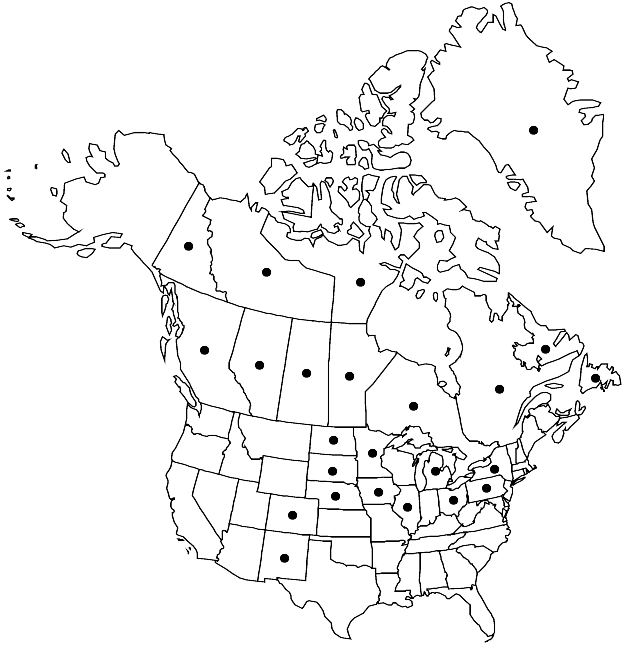Difference between revisions of "Ptychostomum cernuum"
Syll. Pl. Nov. 1: 64. 1822.
FNA>Volume Importer |
FNA>Volume Importer |
||
| Line 29: | Line 29: | ||
|elevation=low to high elevations (0-3000 m) | |elevation=low to high elevations (0-3000 m) | ||
|distribution=Greenland;Alta.;B.C.;Man.;Nfld. and Labr.;N.W.T.;Nunavut;Ont.;Que.;Sask.;Yukon;Colo.;Ill.;Iowa;Mich.;Minn.;Nebr.;N.Mex.;N.Y.;N.Dak.;Ohio;Pa.;S.Dak.;s South America;Eurasia. | |distribution=Greenland;Alta.;B.C.;Man.;Nfld. and Labr.;N.W.T.;Nunavut;Ont.;Que.;Sask.;Yukon;Colo.;Ill.;Iowa;Mich.;Minn.;Nebr.;N.Mex.;N.Y.;N.Dak.;Ohio;Pa.;S.Dak.;s South America;Eurasia. | ||
| − | |discussion=<p>Ptychostomum cernuum is a circumpolar arctic-boreal to north-temperate species characterized by long ovate-lanceolate leaves with a short awn, green leaf base, autoicous sexual condition, and extremely long, curved capsule. The species is related to P. pallens, but differs in its longer more strongly curved capsules, autoicous sexual condition, larger spores, and yellow-green color. Ptychostomum turbinatum is similar, and generally capsules are needed to separate these species. Ptychostomum cernuum is autoicous, smaller, and has longer narrower ovate-lanceolate leaves, while P. turbinatum is dioicous, often very large, and has broader, more ovate leaves. Ptychostomum cernuum superficially resembles Pohlia elongata.</p> | + | |discussion=<p><i>Ptychostomum cernuum</i> is a circumpolar arctic-boreal to north-temperate species characterized by long ovate-lanceolate leaves with a short awn, green leaf base, autoicous sexual condition, and extremely long, curved capsule. The species is related to <i>P. pallens</i>, but differs in its longer more strongly curved capsules, autoicous sexual condition, larger spores, and yellow-green color. <i>Ptychostomum turbinatum</i> is similar, and generally capsules are needed to separate these species. <i>Ptychostomum cernuum</i> is autoicous, smaller, and has longer narrower ovate-lanceolate leaves, while <i>P. turbinatum</i> is dioicous, often very large, and has broader, more ovate leaves. <i>Ptychostomum cernuum</i> superficially resembles <i>Pohlia elongata</i>.</p> |
|tables= | |tables= | ||
|references= | |references= | ||
| Line 53: | Line 53: | ||
|publication year=1822 | |publication year=1822 | ||
|special status= | |special status= | ||
| − | |source xml=https://jpend@bitbucket.org/aafc-mbb/fna-data-curation.git/src/ | + | |source xml=https://jpend@bitbucket.org/aafc-mbb/fna-data-curation.git/src/8f726806613d60c220dc4493de13607dd3150896/coarse_grained_fna_xml/V28/V28_269.xml |
|genus=Ptychostomum | |genus=Ptychostomum | ||
|subgenus=Ptychostomum subg. Ptychostomum | |subgenus=Ptychostomum subg. Ptychostomum | ||
Revision as of 18:04, 18 September 2019
Plants in dense or open turfs, green or yellow-green. Stems 0.5–3 cm, fertile stems comose, innovations evenly foliate. Leaves green to yellow-green, crowded, strongly contorted to shrunken when dry, ovate-lanceolate, flat, 1–3.5(–4) mm, often gradually enlarged toward stem apex; base green, not decurrent; margins revolute proximally, plane distally, limbidium strong, in 2 or 3 rows; apex acuminate; costa percurrent to short-excurrent, awn stout; proximal laminal cells long-rectangular, 3–5:1; medial and distal cells 18–22 µm wide, 3–4:1, walls thin. Specialized asexual reproduction absent. Sexual condition autoicous. Seta yellow-brown or brown, 2–4 cm, stout, straight to somewhat flexuose. Capsule brown, shape highly variable, elongate-pyriform to clavate, somewhat to strongly curved, (3–)4–6(–7) mm, mouth yellow-brown; hypophysis slender; operculum conic, apiculate; peristome reduced; exostome teeth yellow throughout or rarely hyaline distally, lamellae straight, pores absent near base along mid line; endostome not adherent to exostome, basal membrane 1/2 exostome height, segments with ovate perforations, cilia absent or rudimentary. Spores 28–32(–35) µm, yellow to green.
Phenology: Capsules mature Jun–Sep.
Habitat: Wet soil, along streams, wetlands, calcareous habitats
Elevation: low to high elevations (0-3000 m)
Distribution

Greenland, Alta., B.C., Man., Nfld. and Labr., N.W.T., Nunavut, Ont., Que., Sask., Yukon, Colo., Ill., Iowa, Mich., Minn., Nebr., N.Mex., N.Y., N.Dak., Ohio, Pa., S.Dak., s South America, Eurasia.
Discussion
Ptychostomum cernuum is a circumpolar arctic-boreal to north-temperate species characterized by long ovate-lanceolate leaves with a short awn, green leaf base, autoicous sexual condition, and extremely long, curved capsule. The species is related to P. pallens, but differs in its longer more strongly curved capsules, autoicous sexual condition, larger spores, and yellow-green color. Ptychostomum turbinatum is similar, and generally capsules are needed to separate these species. Ptychostomum cernuum is autoicous, smaller, and has longer narrower ovate-lanceolate leaves, while P. turbinatum is dioicous, often very large, and has broader, more ovate leaves. Ptychostomum cernuum superficially resembles Pohlia elongata.
Selected References
None.